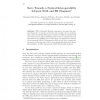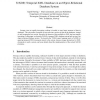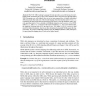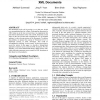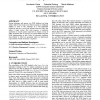125
click to vote
FASE
2003
Springer
15 years 7 months ago
2003
Springer
Abstract. XML (eXtensible Markup Language) is becoming the standard format for documents on Internet and is widely used to exchange data. Often, the relevant information contained ...
119
Voted
ERSHOV
2003
Springer
15 years 7 months ago
2003
Springer
Storage costs are rapidly decreasing, making it feasible to store larger amounts of data in databases. This also makes it possible to store previous versions of data in the databa...
ERCIMDL
2003
Springer
15 years 7 months ago
2003
Springer
As many metadata are encoded in XML, and many digital libraries need to manage XML documents, efficient techniques for searching in such formatted data are required. In order to e�...
115
click to vote
ER
2003
Springer
15 years 7 months ago
2003
Springer
XML is becoming a prevalent format for data exchange. Many XML documents have complex schemas that are not always known, and can vary widely between information sources and applica...
102
click to vote
BTW
2003
Springer
15 years 7 months ago
2003
Springer
Abstract:The W3C XML Linking Language (XLink) provides a powerful means for interlinking XML documents all over the world. While the effects when browsing through linked XML docume...
117
click to vote
BTW
2003
Springer
15 years 7 months ago
2003
Springer
: XML is the upcoming standard for internet data. Java is the most important programming language for internet applications. Nevertheless, in today’s languages and tools there is...
129
click to vote
XMLSEC
2003
ACM
15 years 7 months ago
2003
ACM
The information on the web is growing at a very fast pace. In this ever-accumulating data, the volume of information represented in XML format is on the rise in recent times. An o...
WIDM
2003
ACM
15 years 7 months ago
2003
ACM
Storage techniques and queries over XML databases are being widely studied. Most works store XML documents in traditional DBMSs in order to take advantage of a well established te...
101
click to vote
APLAS
2003
ACM
15 years 7 months ago
2003
ACM
When constructing programs to process XML documents, we immediately face the question as to how XML documents should be represented internally in the programming language we use. C...
125
click to vote
WISE
2003
Springer
15 years 7 months ago
2003
Springer
There is much current interest in publishing and viewing databases as XML documents. The general benefits of this approach follow from the popularity of XML and the tool set avai...
